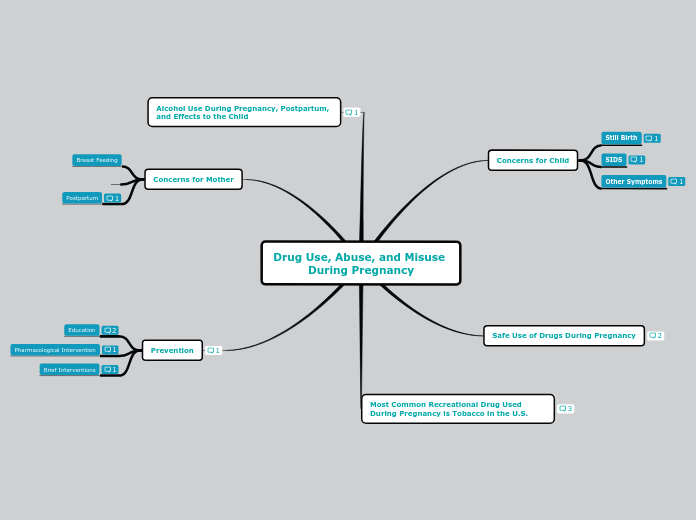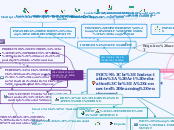Drug Use, Abuse, and Misuse During Pregnancy
Prevention
In my opinion applying a multiple intervention approach such as a brief intervention, followed up with pharmacological intervention (if applicable), with cognitive behavior therapy, and home visits would benefit the mother during pregnancy and postpartum.
Brief Interventions
Brief interventions show promise in the cessation of some drug use, but for how long is still in question.
Pharmacological Intervention
Treatment for opiate dependent women with methadone during pregnancy and in the postpartum period can help prevent an adverse effect on the child.
Education
According to some research expectant mothers did not know that their drug use early in pregnancy had such a big effect on their children. Mothers would discontinue use or cut back during the third trimester.
Promotion of breastfeeding might prevent or delay postpartum relapse.
Concerns for Mother
Postpartum
Illicit drug use during the postpartum period is also associated with an
increased risk of child neglect, violence exposure, physical abuse, and
maternal mental health issues.
Breast Feeding
Alcohol Use During Pregnancy, Postpartum, and Effects to the Child
Ethanol easily crosses the placenta into the fetus, with a significant concentration of the drug identified in the amniotic fluid as well as in maternal and fetal blood. Growth restriction is 1 of the hallmarks of prenatal alcohol exposure. There is a wide variety of negative effects of prenatal alcohol exposure. Poor habituation and low levels of arousal along with motor abnormalities have been identified in women who drank alcohol heavily during their pregnancy. Heavy alcohol use during breast feeding has been shown to be associated with decreased milk supply and neurobehavioral effects on the infant. Prenatal alcohol exposure is linked with significant attention problems in offspring as well as adaptive behavior problems spanning early childhood to adulthood. Problems identified included disrupted school experiences, delinquent and criminal behavior, and substance abuse.Prenatal alcohol exposure frequently is cited as the most common, preventable cause of intellectual disability. Prenatal alcohol exposure has been associated with poorer memory and executive functioning skills.
Most Common Recreational Drug Used During Pregnancy is Tobacco in the U.S.
Tobacco is the most common recreational drug used during pregnancy followed by alcohol. It is common for mothers-to-be who use recreational drugs to use more than one drug.
In 2012 15.9% of pregnant women used tobacco and 8.5% drank alcohol.
According to the World Health Organization, marijuana is the most used drug during pregnancy worldwide.
Safe Use of Drugs During Pregnancy
Because of ethical issues most OTC drugs have not been evaluated in controlled trials. However, the following OTC's have shown a relatively safe record: Acetaminophen, chlorpheniramine, kaolin and pectin preparations, and most antacids. These drugs are considered analgesics and are in category B or D, depending on the trimester of use, in the FDA Drug Safety Classification during Pregnancy table.
Women commonly use cold medications during pregnancy. These medications, like most of the other OTC drugs, have not been studied well in pregnancy. Since 1975, the U.S. Food and Drug Administration (FDA) has assigned pregnancy risk factors to all drugs used in the United States. Unfortunately, many drugs have not been adequately researched during pregnancy and, because of ethical considerations, probably will not be in the future.
Concerns for Child
Other Symptoms
Birth defects, Low birth weight, Premature birth, Small head circumference
SIDS
Mothers who used alcohol and tobacco past the first trimester are 12 times as likely to have a child who dies from Sudden Infant Death Syndrome.
Still Birth
Using tobacco, specific stimulants such as marijuana and some prescriptions can cause 1.8 to 2.8 greater risk of stillbirth









